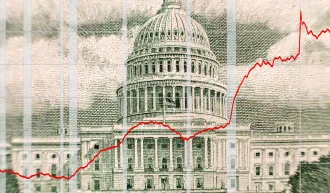May 16, 2013
| by Edmund L. Andrews

Jamie Dimon, the chairman and chief executive officer at JPMorgan Chase & Co (Reuters)
The proxy fight at JPMorgan Chase & Co. over whether to separate the roles of chairman and chief executive — and thus strip Jamie Dimon of the title of chairman — has become a media spectacle and a Rorschach test for arguments about CEO power, shareholder rights, and Dimon himself.
Two major advisory firms for institutional investors, Institutional Shareholder Services Inc. and Glass Lewis & Co., support resolutions that would separate the two jobs and replace several board members loyal to Dimon. Backers of Dimon, such as media mogul Barry Diller, have mounted a noisy countercampaign in his defense. Dimon himself warned that he might quit if the vote goes against him.
But what about the underlying question: Do shareholders benefit if a corporation’s chairman and CEO are separate? Probably not.
David F. Larcker and Brian Tayan, of the Center for Leadership Development and Research at Stanford Graduate School of Business, recently reviewed studies conducted over the past two decades. The studies found that separating the roles of chairman and CEO has had little or no effect on either a company’s stock price or its future operating performance. In fact, say Larcker and Tayan, multiple studies have also found that other corporate-governance reforms, such as those on setting executive pay, haven’t had much impact. Some companies do well with tighter board oversight, while others do not. Overall, the results are a wash.
The benefit of a particular governance structure, the authors conclude, depends on the nature of the individual company and the character of the chief executive. If the CEO is “narcissistic” — a creative, big-picture strategist, but potentially inclined to excessive risk-taking — it may make sense to put checks on his or her power. For lower-key executives, such checks may simply create inefficiency.
“”Instead of debating features of corporate governance,” Larcker and Tayan wrote in a recent summary of the research, “more attention should be paid to contextual issues — a company’s leadership, culture, and specific situation.”
The authors note that narcissistic CEOs have both strengths and weaknesses. A “productive narcissist” can be creative, make bold decisions, and get big results. But studies have also shown that narcissistic CEOs, eager to attract attention, tend to overpay for acquisitions and may be inclined to take excessive risks. For that kind of chief executive, stronger board oversight may be a good idea.
Larcker and Tayan don’t venture any opinions about Jamie Dimon or JPMorgan. But the basic conclusion is clear: Simply changing specific structural features of corporate governance doesn’t in itself produce better results.
For media inquiries, visit the Newsroom.





